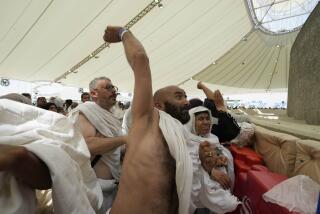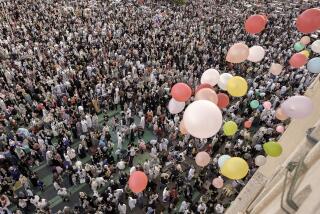Iraqi Shiites converge in Karbala for holiday
- Share via
Reporting from Baghdad and Karbala, Iraq — An estimated 3 million people gathered Sunday in the Iraqi city of Karbala to mark the Shiite holy day of Ashura at the beginning of the Muslim new year. Men, shrouded in white, performed the rituals suppressed under Saddam Hussein: cutting their foreheads with knives in mourning for the death of Imam Hussein, a grandson of the prophet Muhammad, on the same day in 680.
But for many who flocked to Karbala, their feelings were different than in recent years when such holy days served as a rallying cry for the country’s Shiite majority.
Instead of celebrating their ascendancy as a community, many pilgrims spoke openly of their antipathy for Baghdad’s current Shiite elite and their regret over their decision in 2005 to cast ballots strictly along sectarian lines. Some debated not voting at all in elections scheduled for March, expressing disgust at the government’s record.
The festivities, marred by violence that left five dead across the country, provided a glimpse of the major challenges that Iraq faces in the next year: the huge gulf between the people and the politicians; and the lingering resentments among Sunni Arabs, who prospered the most under Hussein but now complain about what they perceive to be their second-class status.
How these two issues are resolved will go a long way toward determining whether the country’s democratic experiment succeeds.
Discontent among Shiites has been on full display in Karbala, one of the sect’s most sacred places. In recent months, representatives of the country’s most influential cleric, Grand Ayatollah Ali Sistani, have returned again and again in Friday sermons to the subject of the government’s failings.
On the eve of Ashura, Sistani’s representative in Karbala, Sayed Ahmad Safi, delivered a scathing critique of the political establishment to the tens of thousands gathered for the religious rites.
“More than 50% of our people live in poverty in a rich country, but when we see all the circumstances this poses a question mark. Why is there not a quorum in the parliament? Why is there no legislation [passed]? Why don’t the executives come spontaneously without an invitation” to parliament, Safi asked in his Friday sermon.
“We cannot hinder the progress anymore because of [officials’] personal reasons, trips or holidays,” he added. “This must be considered: The secrets must come out [about] the financial corruption.”
Pointedly, Sistani has declined to endorse any party, in contrast to 2005, when his name was associated with the Shiite coalition running in the two elections that year.
On Sunday, worshipers echoed the complaints broached by Sistani’s representative and expressed cynicism about the March elections.
Ghaith Saadi, a 46-year-old cellphone store owner in Baghdad’s Sadr City neighborhood, traveled to Karbala for the holiday. He recalled how hopeful he had been in 2005 when he dipped his finger in purple ink before he cast his vote.
“After 35 years of repression we had anticipated a new government with a new style. People had ambitions to live in security and democracy, but those who came to power proved they were not worthy of the responsibilities and did not come to serve the people,” Saadi said. “I now have no desire to participate in the next elections.”
Others expressed a wish to vote, if only to bring in new faces to save the country.
“I will vote to stop bad people from taking power. . . . This government has not achieved anything: Poor services, bad management and corruption everywhere doubled from before,” said Haider Abed Latif, a 39-year-old farmer from Diyala province who had traveled to Karbala.
In Baghdad, an election worker named Mithaq Ali stood outside the gates of the Imam Kadhim shrine watching pilgrims chant prayers to Imam Hussein. Ali, who had been imprisoned in 2002 by Saddam Hussein’s forces for shouting religious slogans, pledged to vote but expressed doubt about Iraq’s rulers.
“We know all these people now. They say one thing and then do another, so I am confused about whom to vote for,” Ali said.
Yet despite the anger expressed toward the government, the day’s celebration appeared to many Sunnis to only underscore the Shiites’ domination of the country.
Across the river from the Imam Kadhim shrine in the mostly Sunni district of Adhamiya, some people groused about the street closures, the constant chants, and around-the-clock coverage of the Shiite holiday on television. They saw the celebrations as a deliberate slap in their face and a fanning of the tensions that have flared into violence since 2003.
“It’s part of their political dominance to show they are in control, and this is why they have pilgrims everywhere and are closing the streets. Definitely there are political motives behind this,” said Amin Hitti, a 32-year-old merchant. “I have decided to leave Iraq. I don’t want to live all my life in danger or have a family here -- no way.”
Fakhrildeen is a special correspondent. Times staff writers Caesar Ahmed and Usama Redha in Baghdad contributed to this report.
More to Read
Sign up for Essential California
The most important California stories and recommendations in your inbox every morning.
You may occasionally receive promotional content from the Los Angeles Times.










